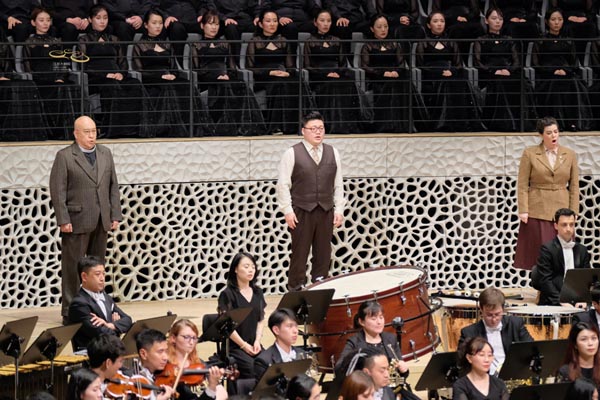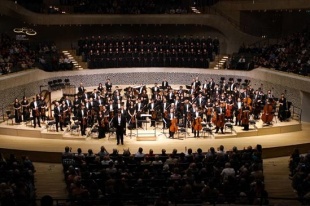A hero's tale heads home


Wiesbrock says he liked the concert. "The music is very good," he says.
Kristian Sievers, a native of Hamburg, says he is excited to learn that Rabe's story was presented as both an opera and a concert opera.
"It's impressive, very powerful ...very emotional and heroic music," says Sievers, whose wife is from Nanjing. Sievers has watched the movie about Rabe online and has also visited the Nanjing Massacre Museum.
"Germany has a history of war and tragedy, so there is interest in these kinds of stories," he adds.
One of the biggest rounds of applause on Saturday night went to Thomas Rabe, the grandson of John Rabe, when he appeared on the stage during the curtain calls.
"Understanding the past is very important if you want to talk about peace in the future," he tells China Daily. He also attended the opera in Berlin last week but says, "the orchestra version is also perfect".
His grandfather died in Berlin on Jan 5, 1950, a little more than a year before he was born.
Thomas says the opera is important to illustrate the historical event and to help people think about what can be done to aid the friendship between China and Japan. He has been an advocate for China and Japan to come to terms with their history.
"We, too, have a very bad history, and my grandfather lived through part of that. It was Nazi Germany here. We are also not allowed to forget this," he says.
Being a member of the Nazi Party helped Rabe negotiate with the Japanese embassy and the Nanjing-based military. Rabe returned to Germany in 1938 and was forced to undergo the very lengthy process of renouncing his Nazi affiliations following World War II.
While Rabe is widely honored in China, a monument dedicated to him was also unveiled in Berlin on Dec 12, 2013, by the Nanjing city government.
Thomas, whose father was born in China, where he spent his first 14 years, now also travels frequently to the country in his role as a guest professor of gynecology at a university in Beijing. His son also works in China.
Liao Yi, general manager of the Jiangsu Center for the Performing Arts Management Co, says they have been constantly improving the show since it was first staged in Nanjing on Dec 13, 2017, the annual National Memorial Day for Victims of the Nanjing Massacre.
"At that time, we were already thinking about how to take the show to John Rabe's hometown," he says.
Liao praises the current version for "being more compact and having a clearer theme and better character portrayal". He describes the European tour as expressing gratitude to John Rabe for his humanitarian love.
Zhou Mo, the director, describes the show as "an unforgettable, lifelong experience".
The Nanjing native left to study in the United States at the age of 18 and later graduated from Columbia University with a master's in fine arts with a focus on stage directing.
She was surprised that few people in the US knew anything about the Nanjing Massacre, so she started to think how that story could be effectively told to the rest of the world.
In 2016, she got the opportunity to direct a stage play based on the life of Chinese-American author and journalist Iris Chang, who wrote The New York Times best-seller, The Rape of Nanking: The Forgotten Holocaust of World War II. During her research, Chang found the diaries of John Rabe and Minnie Vautrin, an American missionary and educator.
"I was just carrying on what Iris Chang and many others have started," Zhou says.
The current show, The Diaries of John Rabe, has been created by a team of artists from more than a dozen countries.
Anna Isabel Lasso, a soprano from Guatemala who played the role of Vautrin, says she had never heard of the story before. "We had heard about the Holocaust of the Jews but never this," she says.
"When I started to read about it, I felt so impressed and I fell in love with the role."
Vautrin first came to China as a missionary and teacher in 1912. She later became the acting president of Ginling Women's College in Nanjing and was working there when the Japanese army invaded the city in 1937. She is credited for saving the lives of 10,000 Chinese refugees during the Nanjing Massacre and was given the nickname, "the Goddess of Mercy".
Lasso admits that it was a very difficult job of learning to sing in Chinese. "It's not singing an aria or a song. It's singing the whole opera. That's completely different," she says.
She was pleased that the German audience liked the show. "In Berlin, they liked it so much, there were people crying," she says.
Tian Haojiang, who plays the role of American missionary John Magee, has lived in the US for 36 years, including many years performing as a bass at the Metropolitan Opera House in New York. He says it was not difficult for him to play the role, since he has always paid attention to things related to the Nanjing Massacre, including attending commemorative events in New York and visiting the museum in Nanjing a couple of years ago.
He describes the attendance of the mostly German audience as proof of the success of the shows.
Magee is also credited for saving thousands of Chinese, and he filmed the aftermath of the Japanese atrocities in Nanjing.
Han Peng played the role of John Rabe in the concert opera on Saturday. He called Rabe "good man" and "full of love for humanity".
"I was deeply moved when I sang," says Han, a tenor with the Shanghai Opera House.





































